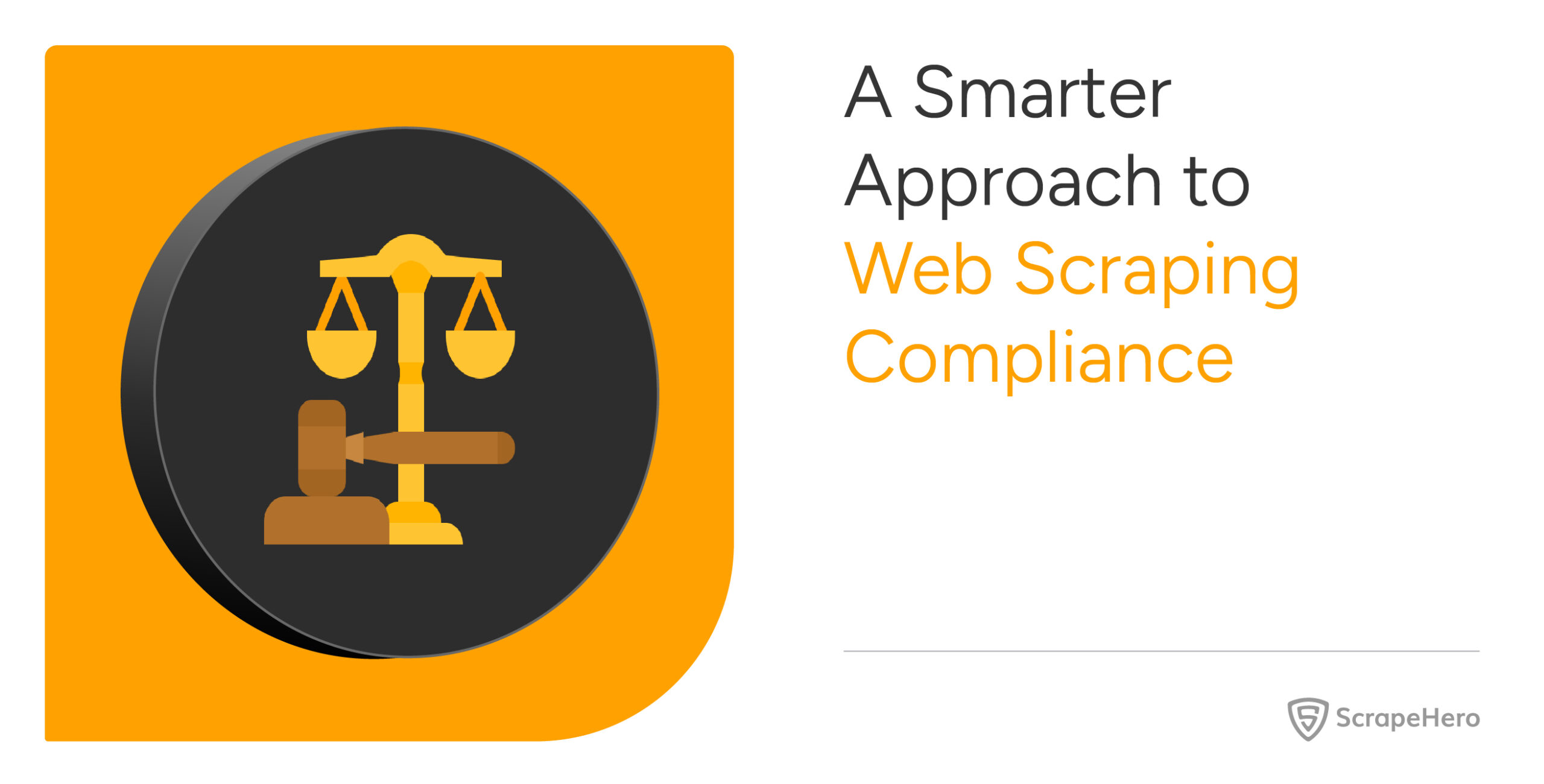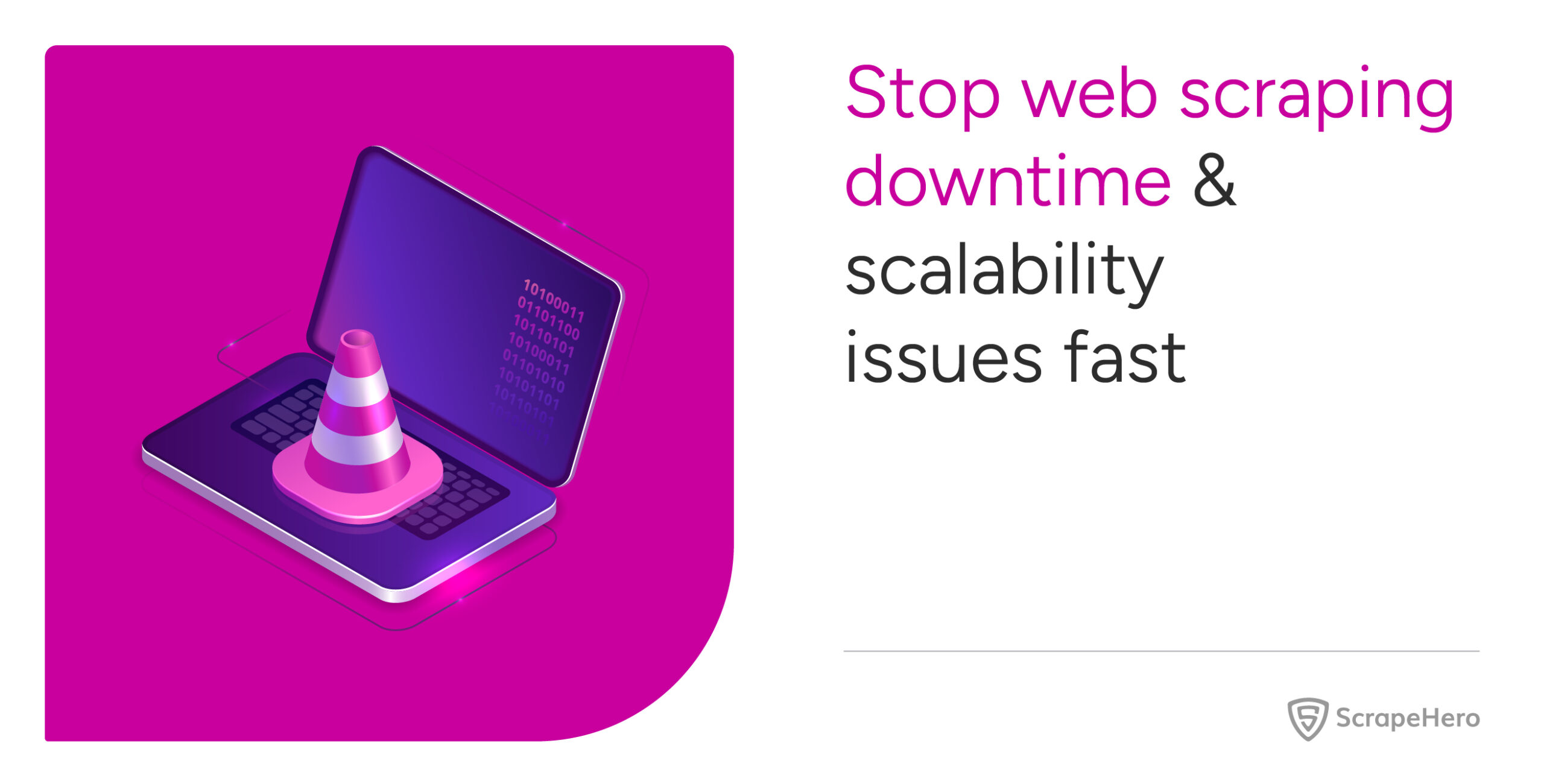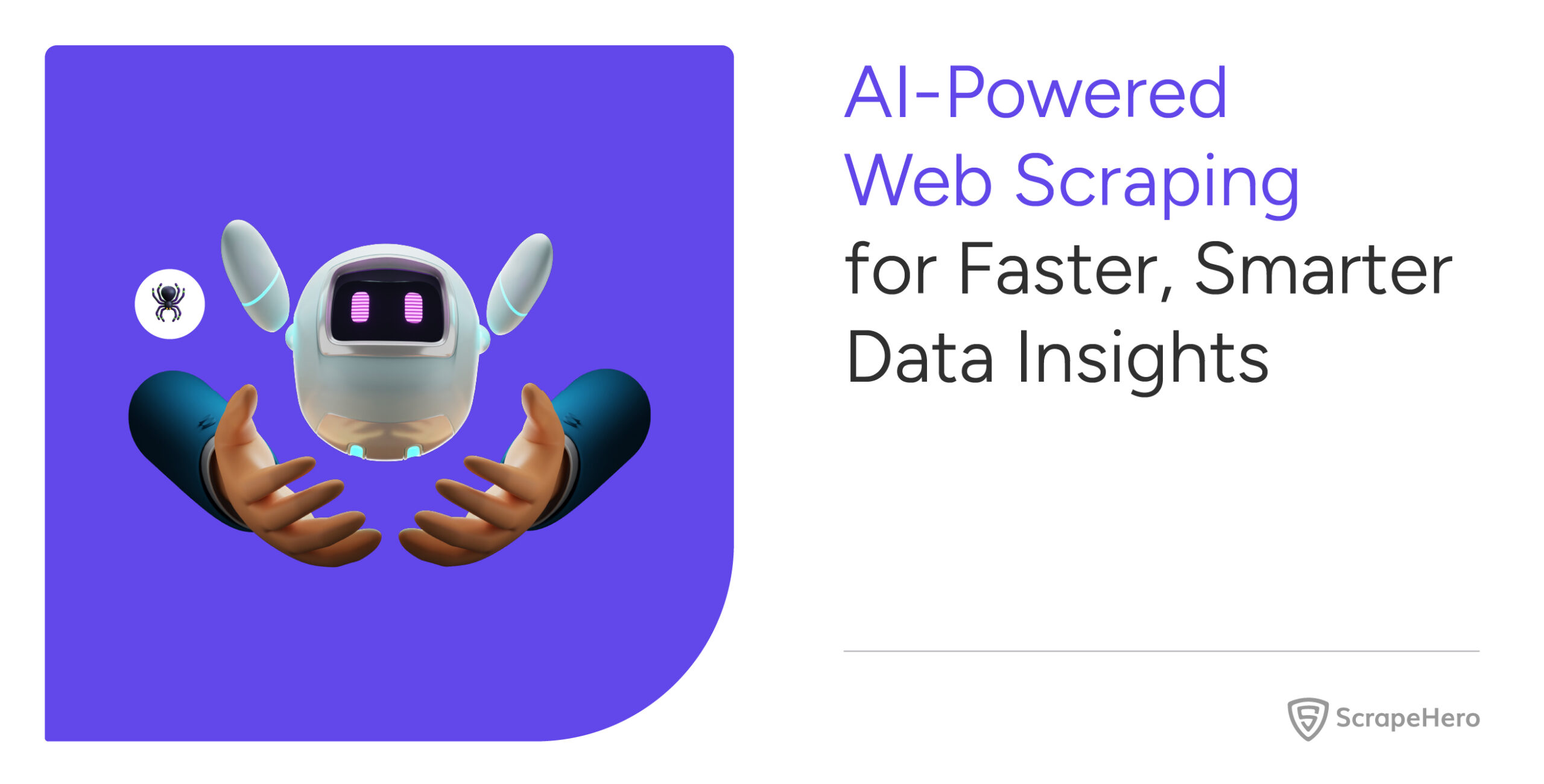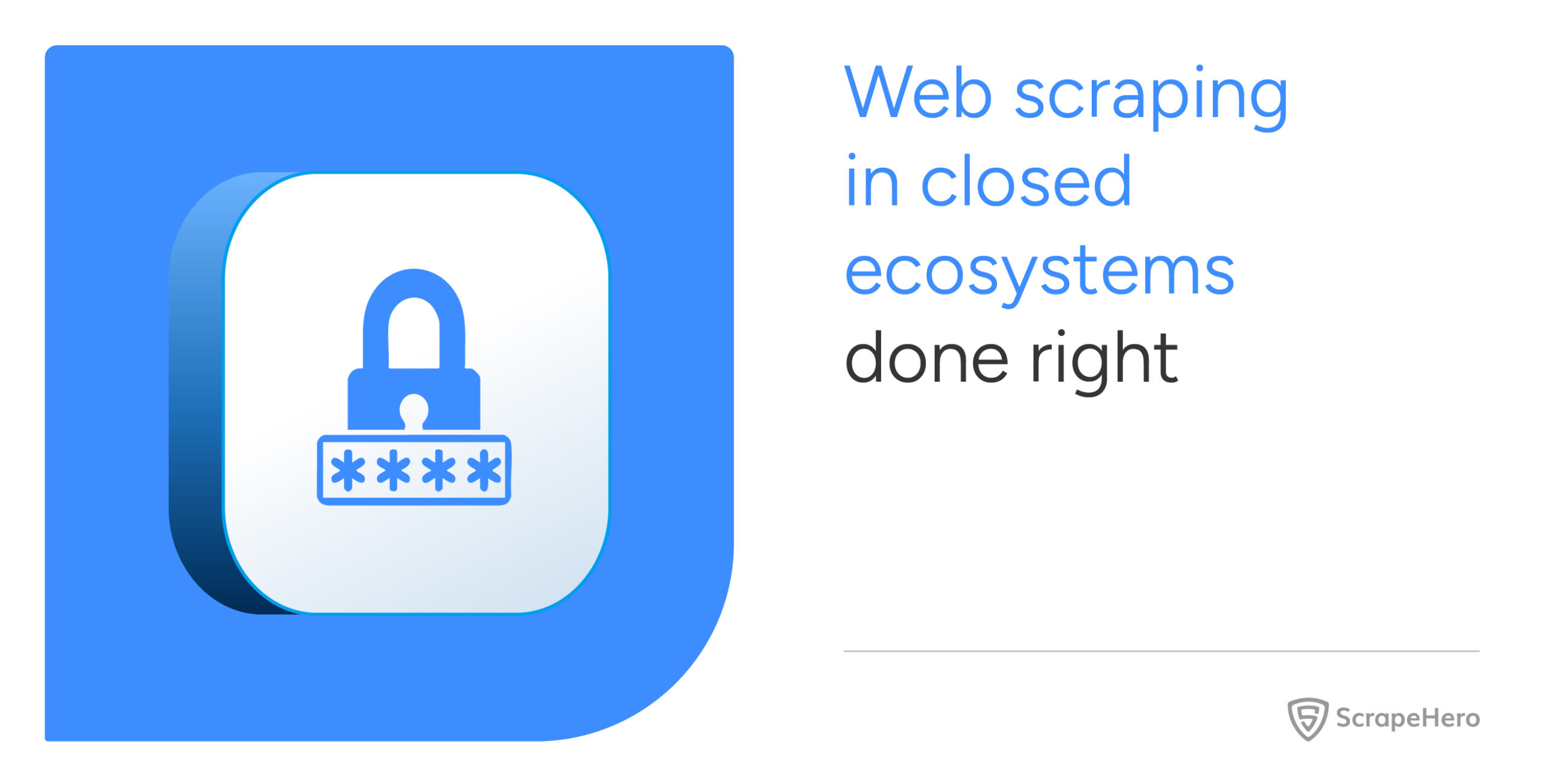Web data is powerful, but collecting it introduces significant legal risks, from GDPR and copyright law to complex website terms.
To avoid the major legal consequences of a single misstep, companies are now relying on outsourced web scraping for compliance.
This article explains how professional web scraping gives you the data you need—safely, legally, and without putting your company at risk.
But to understand the true value of web scraping compliance outsourcing, you first need to see the risks of in-house scraping.
Hop on a free call with our experts to gauge how web scraping can benefit your businessIs web scraping the right choice for you?

The Hidden Dangers of In-House Web Scraping
Most executives see web scraping as simple: either it’s legal or it’s not.
In reality, web scraping involves federal laws, contract rules, privacy regulations, and technical challenges. Your development team isn’t trained for this. Your lawyers probably don’t specialize in this area.
This knowledge gap creates risks that most companies don’t see until it’s too late.
Here are some of the common legal risks in web scraping:
1. The Authorization Problem
The Computer Fraud and Abuse Act (CFAA) is an anti-hacking law. However, its vague rule against “unauthorized access” may apply to web scraping.
When your team scrapes a website, are they “authorized”? The answer isn’t clear. Different courts in the U.S. have given conflicting rulings. The major case of LinkedIn vs. hiQ Labs said scraping public data is allowed, but that ruling only applies in some states. Other courts have disagreed.
Your development team isn’t tracking these complex legal shifts. A simple mistake in judging what’s “authorized” can turn a routine data project into a federal offense with severe penalties.
2. Terms of Service
Many executives think: “The Terms of Service say no scraping, but nobody enforces that.”
This is wrong and dangerous.
Terms of Service are legal contracts. When they prohibit scraping, breaking them means breaking a contract. Companies have won millions in lawsuits based on this.
The bigger problem?
Websites can ban your company completely. If your data team scrapes a site against its rules, that site might block all your employees. Your sales team could lose access to tools they need. The damage can spread across your company.
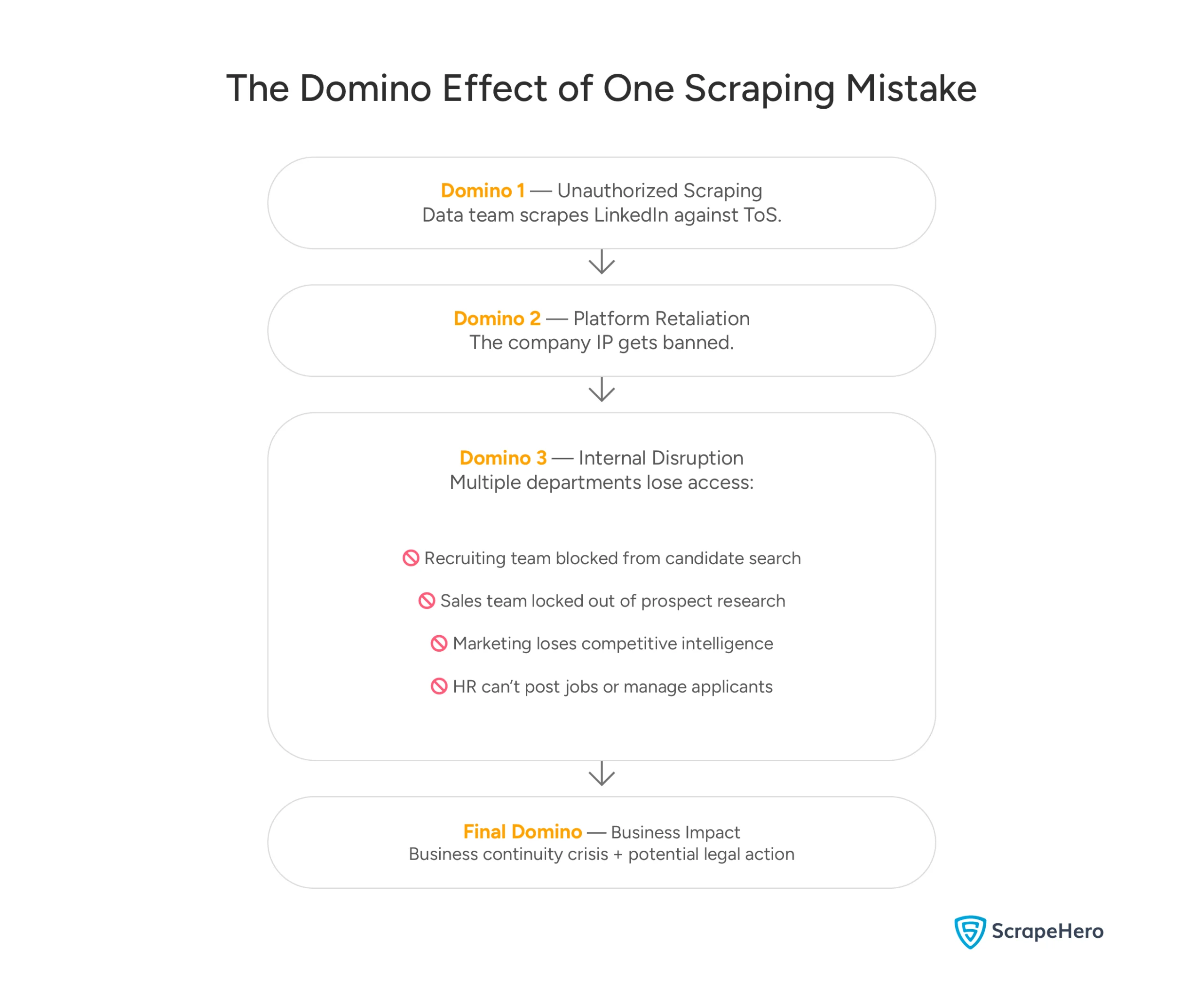
3. Privacy Laws Apply to Scraped Data
Don’t assume that public data is free to collect. Privacy laws like CCPA (California) and GDPR (Europe) set strict rules for how you can use people’s information, even if you found it online.
If your company does business in California, the CCPA rules apply to any personal data you scrape about California residents. Where your company or servers are located doesn’t matter.
GDPR rules are even broader and apply to data about people in Europe. Just because information is publicly available does not give you legal permission to collect and use it. You must have a valid reason, only collect what you need, and keep detailed records.
In short, for most U.S. companies, this is a major burden. Your team likely doesn’t have this specific legal expertise. Yet the penalties are severe: massive fines based on your global revenue under GDPR, and thousands of dollars per violation under CCPA. These are real and growing risks.
4. The Hidden Costs of Maintenance
Beyond legal risks, the infrastructure for scraping drains your team’s time.
Your engineers spend hours:
- Rotating proxy networks to avoid blocks
- Solving CAPTCHAs
- Adjusting request patterns
- Implementing rate limiting
You’re fighting endless technical battles instead of building your business.
Over time, the opportunity cost is huge. Consider: How many projects did your team delay to maintain web scraping infrastructure? How many times were they pulled from crucial work because a target site changed its layout, an IP block halted data flow, or a legal notice demanded immediate attention?
Compliance Benefits of Outsourcing Web Scraping Services
1. Built-in Compliance
Professional web scraping service providers don’t just watch legal changes. They turn them into practical rules.
When courts issue new rulings, they adjust their methods. When states pass new privacy laws, they update their procedures.
This legal monitoring never stops and is complex and expensive to manage in-house. Also, hiring lawyers who understand the web scraping landscape and data privacy laws may cost $150 or more per hour, and training engineers on privacy law is nearly impossible.
This is precisely where web scraping service compliance benefits come into play. You’re not only getting data, but also a built-in legal and technical safety layer.
So, a more efficient approach is to use a service, like ScrapeHero, that has built compliance directly into its core architecture. You benefit from this refined, built-in approach without the overhead.
In other words, the value of legal web scraping outsourcing lies in providing you with data access without having to make risky scraping decisions.
2. Working Ethically
Good scraping isn’t just about what’s legal. It’s about what’s right and sustainable.
Professional services follow these essential rules:
- They respect robots.txt files that specify a website’s preferences.
- They limit request rates to avoid hurting site performance.
- They avoid collecting data during busy hours.
- They know which data is truly public and which is technically accessible.
This is why many brands now turn to outsourcing legal web scraping, as ethical and compliant execution protects long-term access and reduces business risk.
3. Solving the Proxy Problem
Managing proxies seems simple until you try it at scale.
You need different proxies for different sites. You need geographic variety. You need proper rotation timing. You need proxies that aren’t already blocked.
Fortunately, professional services handle this complexity. They know which proxies work for which targets. They monitor proxy health constantly. When problems arise, they fix them in minutes rather than days.
This is another reason companies adopt web scraping compliance outsourcing, as operational stability is built into the service.
4. Problem Handling
What happens when something goes wrong? If a site blocks you, or a cease-and-desist letter arrives?
Professional services face these situations regularly. They have proper response plans and remedies in place. As a result, they handle conflicts so your company doesn’t have to.
However, this protection is only as good as the provider you select.
How to Choose the Right Web Scraping Partner
- Check Their Compliance Statement
- Watch How They Discuss Your Project
- Ask About Their Operations
- Ask for Real Examples
The web scraping market has both good and bad providers. Choosing the wrong one will leave you with all the risk and no protection.
To avoid that, here’s how to find true partners.
1. Check Their Compliance Statement
Good providers proudly share their compliance methods. They will clearly explain:
- How they handle robots.txt
- Their rate-limiting rules
- What data they won’t collect
- Their personal information policies
At the same time, avoid vendors who promise, “We can scrape anything,” without discussing compliance. Look for specific commitments, not vague promises.
2. Watch How They Discuss Your Project
Good partners will ask many questions about your targets and goals. They’ll check the websites’ Terms of Service before agreeing. They might refuse specific projects as too risky.
Initially, this might feel like they’re being difficult. Actually, they’re being careful to protect you.
Providers who accept every project without question either don’t understand compliance or don’t care about your risk.
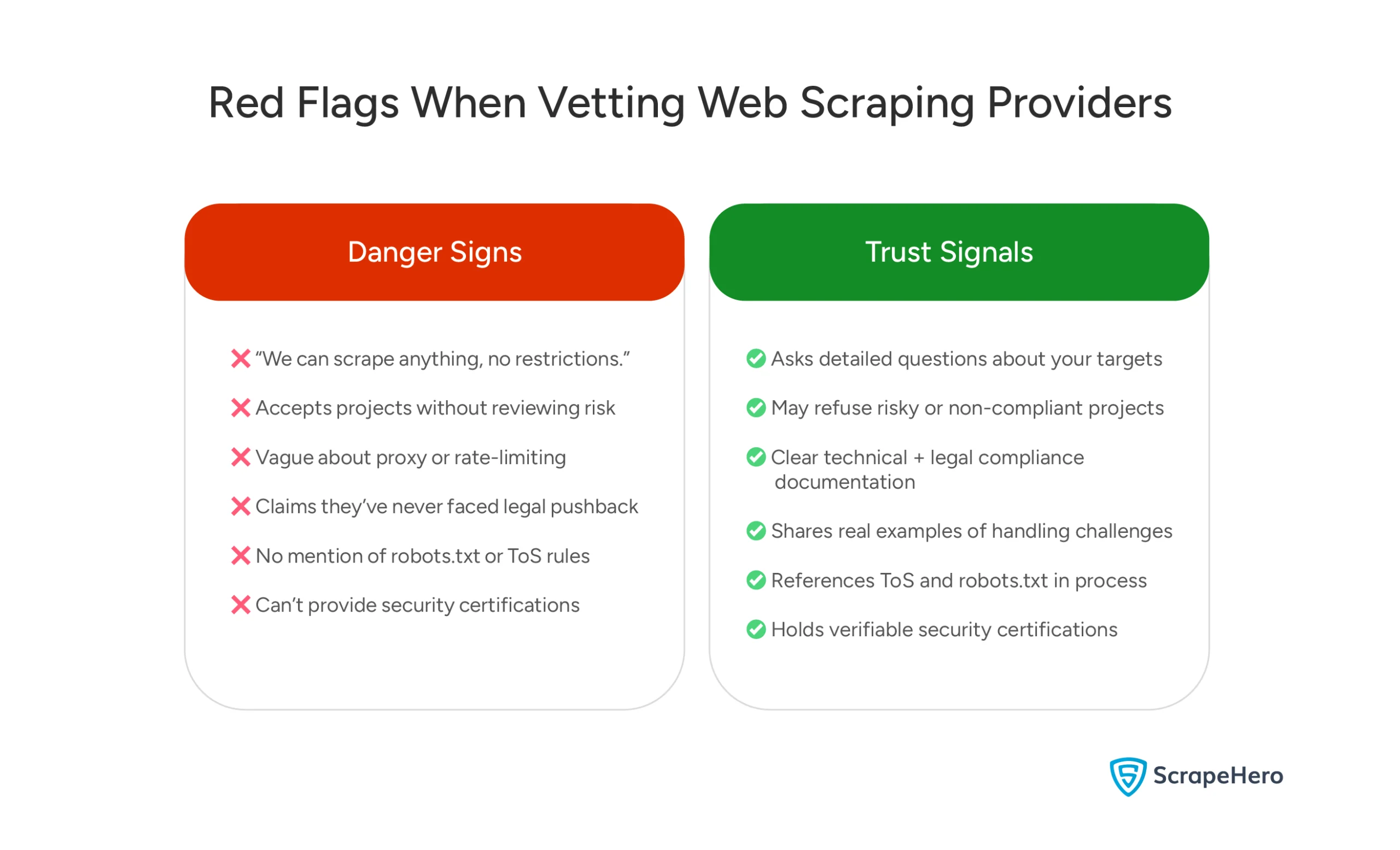
3. Ask About Their Operations
Ask specific questions about their operations:
- How long do they keep your data? (Good answers involve short timeframes.)
- Can they explain their proxy and rate-limiting methods? (Vague answers are bad.)
- Do they have security certifications? (This proves they follow their own rules.)
4. Ask for Real Examples
Don’t be shy. Ask providers about challenging situations they’ve faced:
- How have they handled cease-and-desist letters?
- What happened when major sites blocked them?
- When have they refused projects due to risk?
Providers who claim they’ve never had problems are either new or not being honest. In contrast, experienced providers will share real stories of how they handled challenges.
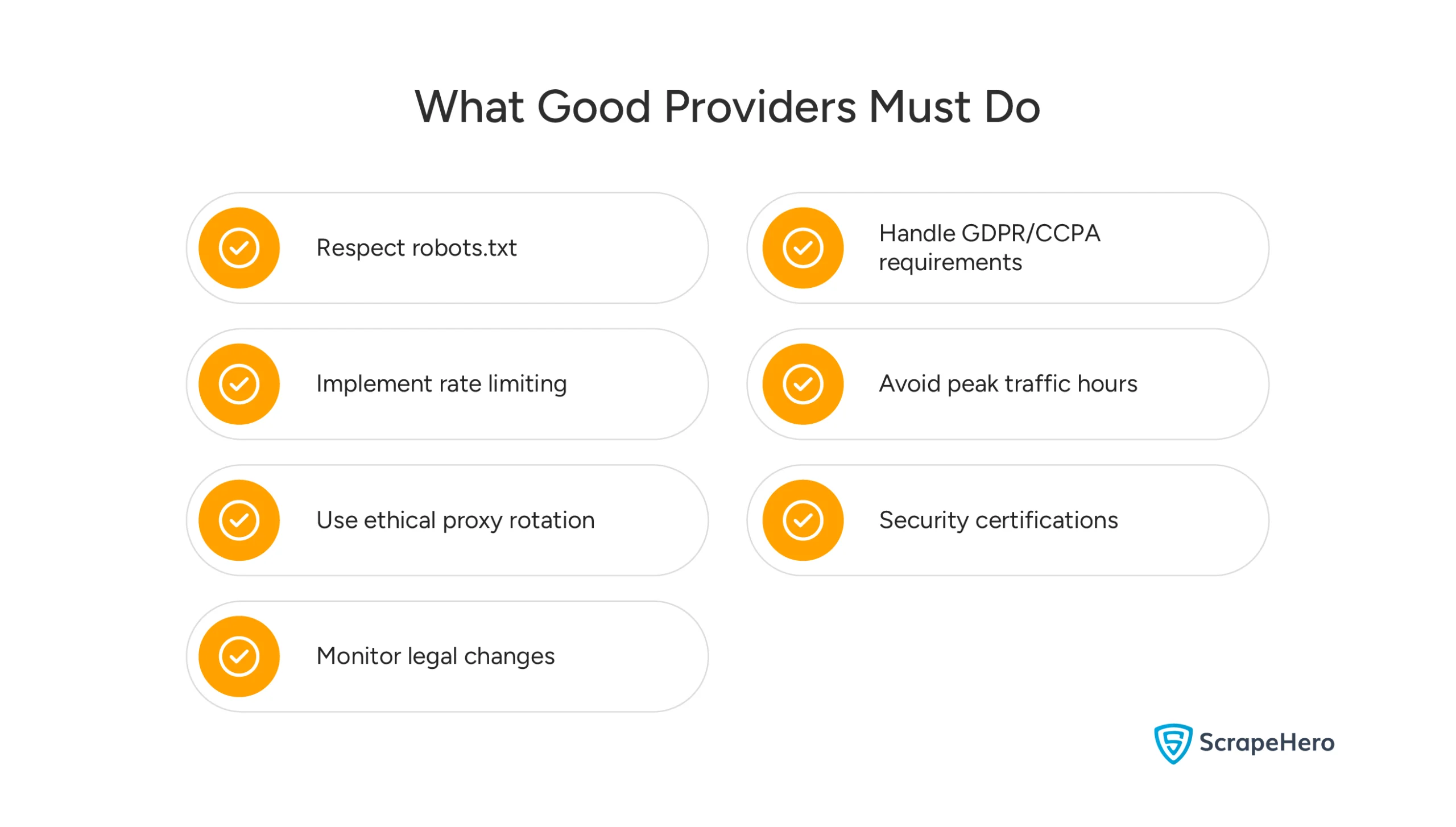
The Business Value of Getting Compliance Right
- Risk Mitigation
- Cost Savings
- Better Operations and Reliability
- Faster Insights
- Easy Scaling
Outsourcing web scraping for compliance does more than avoid problems. It creates real business value.
Let’s look at what that means in practice.
Risk Mitigation
When you partner with professionals, you transfer risk. Their expertise protects you. Think of this protection as a safety net. You operate with the confidence that it’s there, even though you hope you’ll never need it.
This also serves as a critical protection for your reputation. A single data privacy violation can make headlines and trigger expansive regulatory audits. Outsourcing to experts is a cost-effective strategy to keep your company’s name out of the news and off the regulator’s radar.
Cost Savings
Calculate all the costs of internal scraping:
- Engineers’ time (20–40% of their time on maintenance)
- Legal reviews ($150–$500 per hour)
- Proxy services and other tools ($500+ a month, depending on project scope)
- Opportunity cost (delayed projects)
When you total these, outsourcing often costs less, even before counting the risk protection.
Better Operations and Reliability
Internal scraping projects break constantly. Websites change. Anti-bot systems improve. Each change creates emergencies.
In contrast, professional services handle these problems behind the scenes. Your data flow stays steady. Your teams get reliable information instead of constant surprises.
Faster Insights
Professional services deliver clean, ready-to-use data. Your team gets analysis-ready information instead of raw files needing cleaning.
Consequently, this speeds up everything. Your analysts find insights faster. Your leaders get information while it’s still useful. In fast markets, this speed advantage gives you a competitive edge.
Easy Scaling
Business needs are never static. You might need data from 50 sites now and 500 later. You might enter new markets with different laws.
Professional services are built for this scale. They’ve already solved the technical and legal challenges. Their systems grow with your needs without extra work from you.
The Bottom Line: Why Outsourced Web Scraping for Compliance Works
Web data is essential for modern business. Your competitors use it to win. You can’t ignore it and stay competitive.
The question isn’t whether to collect web data. It’s how to collect it safely.
Ultimately, building this capability yourself sounds good until you count the real costs. You need legal expertise, technical infrastructure, and constant monitoring.
On the other hand, outsourced web scraping for compliance provides your company with a safer legal path to this data, avoiding the risk of involving your internal teams.
The better choice? Partner with specialists like ScrapeHero who have already built this capability.
Using ScrapeHero’s web scraping service isn’t about outsourcing a task. It’s about adding a team of experts to your strategy. We help you use web data confidently, without fearing legal threats.
Ready to make web data a strength instead of a risk? Contact ScrapeHero to discuss your needs and learn how our professional approach delivers the intelligence you need.
FAQs
Only collect public data, respect site rules, avoid overloading websites, and never scrape personal or sensitive information.
Yes, if you lawfully collect public data and handle any personal data in accordance with GDPR requirements.
Risks include breaking website terms, violating copyright or privacy laws, and facing legal claims for misuse of data.

